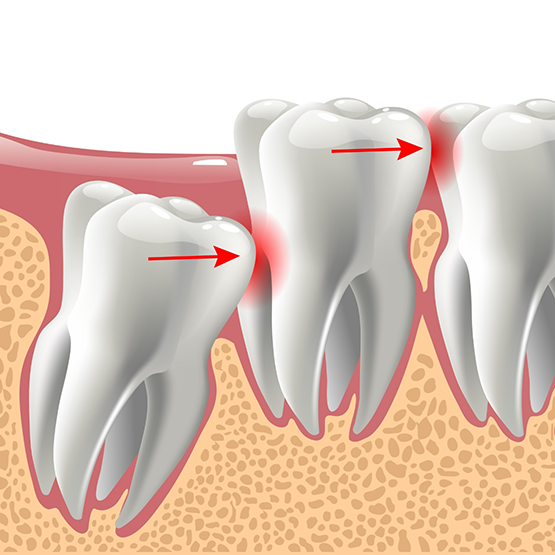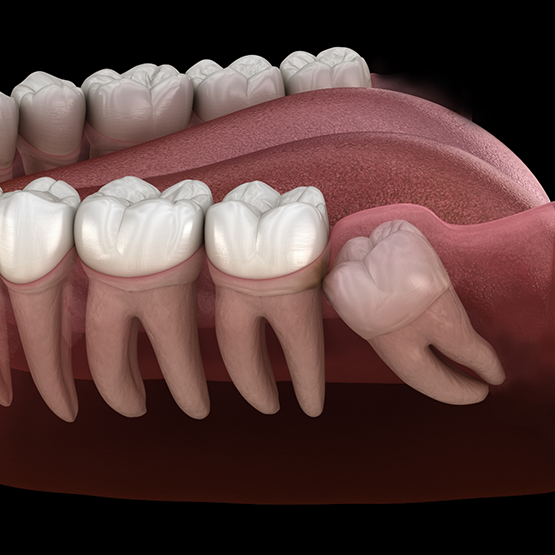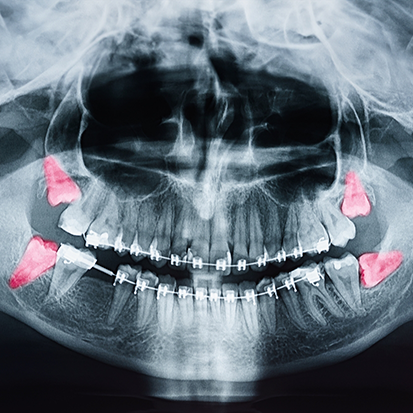Wisdom Tooth Extractions Granby
We Remove Frustrating Wisdom Teeth

Usually, between the ages of 16 and 25, the last set of adult teeth erupt. These third molars are colloquially called wisdom teeth, and people used to need these teeth to compensate for previous tooth loss. However, thanks to oral hygiene, many people nowadays retain their natural teeth for longer. Without enough room for these teeth, when the wisdom teeth come in, they can actually force other teeth out of alignment, or they can develop at an unhealthy angle, causing infections. When these situations happen, our dentists at Salmon Brook Dental can perform wisdom tooth extractions in Granby to preserve the patient’s healthy smile.
Why Choose Salmon Brook Dental for Wisdom Tooth Extractions?
- Nitrous Oxide Sedation Available for Anxiety Patients
- Caring, Dedicated Team of Dental Professionals
- Dental Insurance Accepted
What Are Wisdom Teeth?

Commonly referred to as third molars by the dental community, most patients know them as wisdom teeth. Located toward the back of the mouth, they may fully erupt, partially erupt, or remain impacted beneath the gumline.
Although once vital to early civilizations and their diets, they no longer serve a purpose but instead, often cause patients much pain. As jaws narrowed over time and food sources improved, these teeth are no longer necessary for maintaining a nutrient-rich diet.
Why Do Wisdom Teeth Need to Be Removed?

There are many reasons wisdom teeth might need to be removed, but the most common are:
- Impaction, which means they exist beneath the gumline and can damage nearby healthy tooth structures
- Potential for decay because they are hard to clean (i.e., partially erupted wisdom teeth)
- Misalignment caused by the pressure and pushing of impacted teeth on healthy structures
- Cyst formations
What to Expect From Wisdom Tooth Extraction

When preparing for a wisdom tooth extraction, our team will determine if you need only one removed or all four. Depending on the state of these teeth, we will either recommend a simple or surgical procedure.
If the teeth have fully or partially erupted, we will use specialized dental instruments such as an elevator and dental pliers to gently rock the teeth back and forth until they fully detach from the sockets. If you have impacted wisdom teeth, however, we will need to perform a more invasive procedure that involves making incisions in the gum tissues to expose the underlying tooth structures. We will then extract the teeth in sections to avoid removing as much of the bone as possible.
Recovering from Wisdom Tooth Extractions

Our dentists and our team at Salmon Brook Dental work diligently to make sure that you or your child is completely comfortable throughout the wisdom teeth extraction procedure, but aftercare can also play a significant role in the recovery process. To ensure that you heal properly, you should do the following:
- Keep clean gauze on the surgical site for several hours after the procedure until all bleeding has stopped.
- Allow a blood clot to form on the site to protect it from bacteria.
- Get plenty of rest and abstain from strenuous activity for a few days.
- Eat soft foods for a few days, but do not use a straw.
- Rinse your mouth with salt water to keep the site clean.
Understanding the Cost of Wisdom Tooth Extractions

As important as it is to have wisdom teeth removed before they can cause further problems, you do need to be mindful of the costs associated with the procedure. Not every patient will pay the same amount for a wisdom tooth extraction because there are so many factors that can influence the price. We can discuss how much your procedure is likely to cost during your first wisdom tooth appointment, but the information below can help give you a head start.
Factors That Can Impact the Cost of Wisdom Tooth Extractions

- Number of Wisdom Teeth: Many people have four wisdom teeth – two for the upper arch and two for the lower arch. That said, there are plenty of cases where only one to three wisdom teeth are present. Needless to say, the number of teeth being removed can significantly affect the cost of the extraction process.
- Whether Wisdom Teeth are Impacted: Wisdom teeth that have managed to erupt can be removed via a simple extraction. Impacted wisdom teeth, on the other hand, require surgical extraction, which tends to cost more.
- The Type of Impaction: If your wisdom teeth are impacted, the type of impaction can make a difference. A tooth that’s lodged within the jawbone is usually more difficult to remove than one that is simply trapped under the gums.
- Type of Dental Specialist: You might need to be referred to an oral surgeon for especially complex extractions, which could affect how much you pay.
Does Dental Insurance Cover Wisdom Tooth Extractions?

Every dental insurance plan is different, so the only way to get a definite answer to this question is to speak with your dental insurance provider; they’ll be able to give you an outline of your benefits and explain what procedures you can expect to be covered.
You can generally expect dental insurance to partially cover the cost of a wisdom tooth extraction. Coverage can be anywhere from 50% to 80% based on what plan you have. Remember that in many cases, you will need to meet your deductible for the year before your insurance company pays anything. You should also be aware of the annual maximum, which puts a limit on the amount your insurance will pay for dental care in a 12-month period.
How to Make Wisdom Tooth Extractions Affordable

Not everyone is able to rely on dental insurance to get the care they need, which is why our team is ready to help you explore other financial options. In many cases, we might suggest applying for a CareCredit financing plan. Each plan lets you divide the cost of a given treatment so that you can pay for it over several months. CareCredit can be used to help make a wide range of dental services more budget-friendly, and wisdom teeth extraction is certainly included in that.
